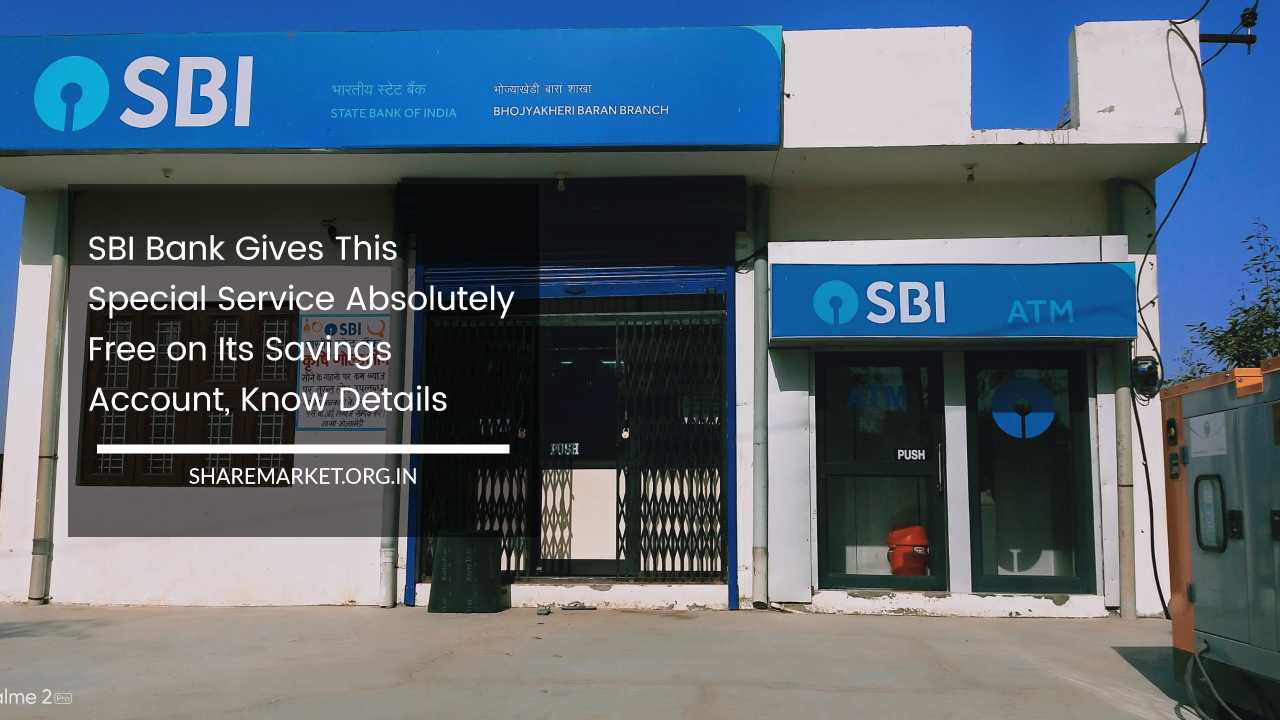SBI Bank Gives This Special Service Absolutely Free on Its Savings Account, Know Details

SBI Bank
SBI Bank Provides Free Services with Its Savings Accounts: Everything You Need to Know
The State Bank of India (SBI) is one of the largest and most established public sector banks in the country. It offers a range of savings accounts designed to meet the diverse needs of its customers.
Whether you’re looking for a simple, no-frills account or one with advanced features and digital conveniences, SBI has a solution that’s right for you.
In this comprehensive guide, we will explore the different types of savings accounts offered by SBI, their unique features, and the benefits they provide, including several complimentary services that come with these accounts.
Basic Savings Account
The Basic Savings Account is an entry-level account designed to provide essential banking services to a broad range of customers.
It is particularly well-suited for individuals who prefer a straightforward account without the complexities of additional banking features.
Features of the Basic Savings Account
- No Minimum Balance Requirement: One of the most attractive features of the Basic Savings Account is that it does not require you to maintain a minimum balance. This means you have the flexibility to keep any amount of money in the account without worrying about incurring penalties for falling below a specified balance.
- No Upper Deposit Limit: You can deposit any amount of money into your Basic Savings Account. There are no restrictions on the maximum amount you can maintain in the account, allowing for greater flexibility in managing your funds.
- Free ATM-Debit Card: When you open a Basic Savings Account, you will receive a basic Rupay ATM-cum-debit card. This card allows you to withdraw cash from ATMs and make purchases at various merchants. It provides convenient access to your funds and facilitates cashless transactions.
- No Checkbook Facility: It’s important to note that this account does not include a checkbook. Therefore, if you require check-writing capabilities, you may need to consider other account options offered by SBI.
Benefits of the Basic Savings Account
- Ideal for Low-Income Individuals: The Basic Savings Account is designed to cater to individuals with lower incomes or those who do not have the ability to maintain a high balance. Its lack of minimum balance requirements makes it a suitable choice for those who prefer to deposit smaller amounts regularly.
- Flexibility: The absence of a maximum deposit limit and no minimum balance requirement offers significant flexibility. This feature is beneficial for individuals who may not have a stable income or who prefer to maintain varying balances in their account.
- Cost-Effective: With no monthly maintenance fees or minimum balance charges, the Basic Savings Account is a cost-effective option for those who want to keep their banking costs minimal.
Basic Savings Bank Deposit (BSBD) Small Account
The Basic Savings Bank Deposit (BSBD) Small Account is another variant designed to accommodate individuals who may not have the required KYC (Know Your Customer) documents for opening a traditional savings account. This account provides essential banking services while offering a simpler account opening process.
Features of the BSBD Small Account
- No KYC Documents Required: One of the key features of the BSBD Small Account is that it does not require KYC documents at the time of account opening. This makes it an accessible option for individuals who may not possess formal identification documents.
- Account Conversion: While the BSBD Small Account can be opened without KYC documents, it can be converted into a Basic Savings Deposit account by providing the necessary KYC documentation at a later stage. This allows customers to upgrade their account and enjoy additional features if needed.
- Maximum Balance Limit: The BSBD Small Account has a maximum balance limit of ₹50,000. This means that account holders can maintain up to ₹50,000 in the account. If the balance exceeds this limit, the account will need to be upgraded or converted.
- Basic Banking Services: Despite the simpler account opening process, the BSBD Small Account offers most of the essential banking services. These include making deposits, withdrawing funds, and accessing account statements.
Benefits of the BSBD Small Account
- Accessibility: The BSBD Small Account is ideal for individuals who do not have access to formal identification documents but still wish to benefit from basic banking services. It provides a straightforward way to open a bank account and manage finances.
- Conversion Option: The ability to convert the account into a Basic Savings Deposit account provides flexibility. If you later acquire the necessary KYC documents, you can upgrade your account to enjoy additional features and benefits.
- Simplicity: The BSBD Small Account offers a simple and hassle-free way to access essential banking services without the need for extensive documentation.
SBI Savings Account
The SBI Savings Account, often referred to as the SBI Saving Bank Account, is a more advanced option that provides a comprehensive range of features and conveniences.
It is designed to cater to customers who seek a blend of traditional banking services and modern digital conveniences.
Features of the SBI Savings Account
- Digital Banking Services: The SBI Savings Account comes with a range of digital services that make managing your account easy and convenient. These include:
- Mobile Banking: Access your account, perform transactions, and check your balance using SBI’s mobile banking app.
- SMS Alerts: Stay informed about account activities, such as transactions and balance updates, through SMS alerts.
- Internet Banking: Manage your account online, transfer funds, pay bills, and access various banking services via SBI’s internet banking portal.
- YONO App: The YONO (You Only Need One) app offers a one-stop solution for banking needs, including account management, bill payments, and more.
- State Bank Anywhere: Provides easy access to banking services anytime, anywhere.
- SBI Quick Missed Call Facility: Quickly check your account balance and receive mini-statements through missed call alerts.
- Free Checkbooks: Account holders receive up to 10 complimentary checks per financial year. If you require additional checks, they are available at a nominal cost. The fee for an additional set of 10 checks is ₹40 plus GST, while 25 checks cost ₹75 plus GST.
- No Average Balance Requirement: The SBI Savings Account does not mandate maintaining an average balance. This feature allows customers to operate their accounts without the pressure of keeping a specific minimum balance.
- No Maximum Balance Limit: There is no restriction on the maximum balance that can be maintained in the account. You can deposit and hold any amount of money without facing limitations imposed by the bank.
Benefits of the SBI Savings Account
- Comprehensive Digital Features: The inclusion of various digital banking services ensures that customers can easily manage their accounts and perform transactions from the comfort of their homes or on the go.
- Flexibility: The absence of an average balance requirement and no upper limit on the account balance provide significant flexibility. This feature is particularly useful for individuals with fluctuating incomes or large savings.
- Convenient Checkbook Services: The availability of free checks and the option to purchase additional checks at a nominal fee provides added convenience for those who require check-writing capabilities.
- Enhanced Account Management: The digital tools and services available with the SBI Savings Account make it easy to monitor and manage your finances, ensuring a seamless banking experience.
Comparison of SBI Savings Accounts
When choosing a savings account with SBI, it’s essential to consider your specific banking needs and preferences. Here’s a comparative overview of the different savings accounts offered by SBI:
Basic Savings Account vs. BSBD Small Account
- KYC Requirements: The Basic Savings Account requires KYC documentation for opening, whereas the BSBD Small Account does not require KYC documents initially.
- Balance Limits: The Basic Savings Account has no upper limit on deposits, while the BSBD Small Account has a maximum balance limit of ₹50,000.
- Account Conversion: The BSBD Small Account can be converted into a Basic Savings Deposit account by providing KYC documents, offering flexibility for account holders.
Basic Savings Account vs. SBI Savings Account
- Digital Services: The SBI Savings Account offers advanced digital banking features, including mobile banking and internet banking, which are not available with the Basic Savings Account.
- Checkbook Facility: The SBI Savings Account includes free checkbooks, whereas the Basic Savings Account does not offer this service.
- Balance Flexibility: Both accounts offer no minimum balance requirement, but the SBI Savings Account provides additional features and conveniences.
BSBD Small Account vs. SBI Savings Account
- KYC Requirements: The BSBD Small Account does not require KYC documents initially, while the SBI Savings Account does.
- Digital Services: The SBI Savings Account includes comprehensive digital services, whereas the BSBD Small Account focuses on basic banking services.
- Balance Limits: The SBI Savings Account has no maximum balance limit, while the BSBD Small Account allows a maximum balance of ₹50,000.
How to Open an SBI Savings Account
Opening a savings account with SBI is a straightforward process. Here’s a step-by-step guide to help you get started:
Step 1: Choose the Right Account
Determine which type of savings account best suits your needs based on the features and benefits discussed above. Consider factors such as KYC requirements, digital services, balance limits, and checkbook facilities.
Step 2: Gather Required Documents
Depending on the type of account you choose, gather the necessary documents. For the Basic Savings Account and SBI Savings Account, you will need KYC documents such as proof of identity and address. For the BSBD Small Account, KYC documents are not required initially.
Step 3: Visit an SBI Branch or Apply Online
You can open an account by visiting the nearest SBI branch or applying online through SBI’s website. If applying online, you may need to complete the application form and upload scanned copies of your documents.
Step 4: Complete the Application Process
Fill out the application form with your personal details, choose the type of savings account, and submit the required documents. If you’re applying for the BSBD Small Account, the process will be simplified, and you can provide KYC documents later if needed.
Step 5: Receive Account Details
Once your application is processed and approved, you will receive your account details, including your account number, ATM-cum-debit card, and any additional information related to your account.
Final Remarks
SBI offers a diverse range of savings accounts, each designed to meet different banking needs and preferences. From the Basic Savings Account for those seeking simplicity and no minimum balance requirements to the more feature-rich SBI Savings Account with advanced digital services, there is an option for everyone.
The Basic Savings Bank Deposit Small Account provides an accessible option for individuals without KYC documents, while still offering essential banking services.
All SBI savings accounts come with various complimentary services, making them a cost-effective choice for managing your finances.
By understanding the features, benefits, and differences between these accounts, you can make an informed decision and choose the account that best suits your financial needs.
Whether you’re looking for flexibility, digital conveniences, or basic banking services, SBI’s savings accounts are designed to provide a seamless and rewarding banking experience.

















